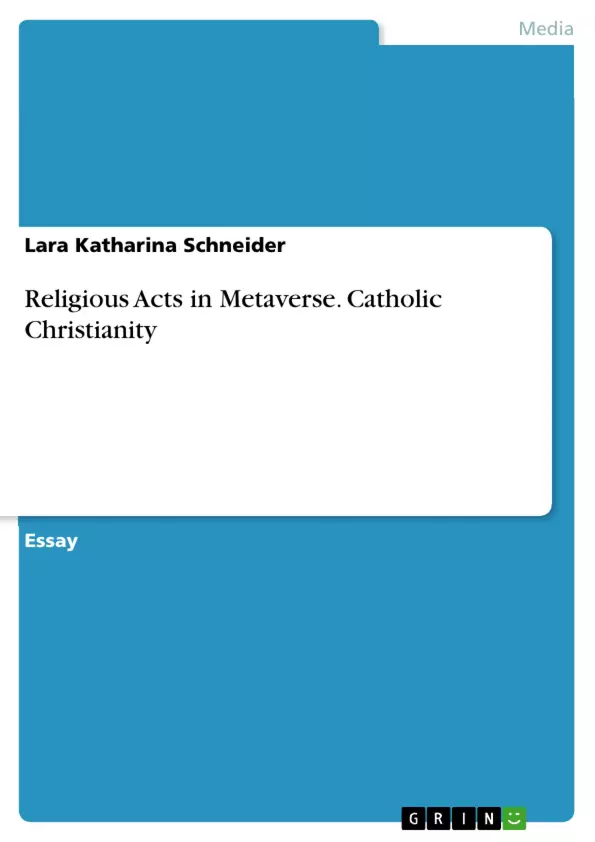A metaverse makes sacred sites virtually accessible to digital pilgrims and offers space for individual and communal faith practices such as worship, prayer, baptisms, funerals, weddings, confessions and other religious rituals. Since 2015, it has been possible within "Experience Makkah" , for example, to visit the holy Mecca and, among other things, insert a prayer note into a crack in the Western Wall or participate in the Holy Fire ceremony. "Buddha-Bot" , a Buddhist chatbot, you can ask for advice in the Japanese Teraverse. Here, however, a fundamental media-scientific and theological question becomes apparent: How valid are religious acts in Metaverse? I will mainly refer to Catholic Christianity, as I have the most contact with it and a consideration of all religions would go beyond the scope of this work.
In October 2021, one of the world's largest social media corporations changed its company name from Facebook to Meta. The background to this is the construction of a so-called metaverse: A new 3D digital internet world where we can work, meet friends, do other everyday things or even attend events and concerts. All from the comfort of our own sofa in the physical world. In the same year, Fortnite developer Epic Games also announced they would invest a billion dollars in a Metaverse project, and Microsoft is also working on an "enterprise meta". Amazon CEO Jeff Bezos is also fascinated by new digital 3D worlds. The metaverse is the "next big thing", the "next level of the internet". A metaverse (or cyberspace) today generally describes a global, virtual reality in which people can move and interact as (non-materialised) avatars within a (meta-)3D online space. The terms metaverse and also avatar were both first mentioned and significantly coined in the 1984 novel "Snow Crash" by Neal Stephenson. In the present, one reads again and again about "God has entered the metaverse" , "Metaverse Church is a Massive Hit During the Pandemic" or "Christians, Beware of the Metaverse".
Inhaltsverzeichnis (Table of Contents)
- Introduction
- Argumentation
- Summary
- Source Index
Zielsetzung und Themenschwerpunkte (Objectives and Key Themes)
This work explores the validity of religious acts in the Metaverse, focusing specifically on Catholic Christianity. It examines the intersection of religion and technology, considering the growing presence of religious practices in virtual reality spaces.
- The nature and significance of religious acts in the Metaverse
- The role of sacraments and rituals in virtual spaces
- Theological and philosophical perspectives on virtuality and reality
- The development and characteristics of the Metaverse
- The potential impact of the Metaverse on religious practice and belief
Zusammenfassung der Kapitel (Chapter Summaries)
- Introduction: This chapter introduces the concept of the Metaverse and its increasing relevance in the contemporary world. It highlights the growing presence of religious practices in virtual reality spaces, posing the question of the validity of religious acts within these environments.
- Argumentation: This chapter delves into the nature of religious practice, focusing on the Catholic Christian tradition. It examines the historical development of sacraments and rituals, their significance in the faith, and their potential application in virtual contexts.
Schlüsselwörter (Keywords)
The primary focus of this work revolves around the concept of the Metaverse, its implications for religious practice, and the theoretical framework of virtuality and reality. Key concepts include sacraments, rituals, Catholic Christianity, virtual reality, and the intersection of faith and technology.
Frequently Asked Questions
Can religious acts be valid in the Metaverse?
This work explores the theological and media-scientific question of whether rituals like prayer, baptism, or confession performed in virtual spaces are considered valid, focusing on Catholic Christianity.
What are some examples of religious practices in virtual reality?
Examples include virtual pilgrimages to Mecca in "Experience Makkah," inserting prayer notes in a virtual Western Wall, or seeking advice from a Buddhist chatbot like "Buddha-Bot."
How does the Catholic Church view virtual sacraments?
The study delves into the necessity of physical presence versus digital interaction for the validity of Catholic sacraments and rituals.
What is the origin of the term "Metaverse"?
The terms "metaverse" and "avatar" were significantly coined in Neal Stephenson's 1984 novel "Snow Crash."
Why did big tech companies like Facebook change their focus to Meta?
The change reflects the strategic shift toward building a 3D digital internet world where people can interact, work, and attend events as avatars.
- Quote paper
- Lara Katharina Schneider (Author), 2023, Religious Acts in Metaverse. Catholic Christianity, Munich, GRIN Verlag, https://www.hausarbeiten.de/document/1338328


